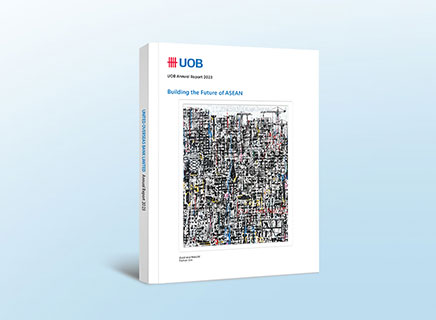Explore ASEAN's FinTech evolution over the past decade, driving digital innovation and inclusion across the region.
Over the past decade, the global FinTech landscape has evolved rapidly, transforming financial services and driving digital inclusion worldwide.
Yet, challenges remain, as recent geopolitical uncertainty and economic headwinds have led to funding cuts. While ASEAN FinTech funding is projected to decline for the third consecutive year, signs of resilience are emerging.
In our FinTech in ASEAN 2024: A decade of innovation report, we reflect on the pivotal moments that have shaped the industry over the last 10 years and explore the potential catalysts that might fuel the next wave of FinTech growth in the region.

Resilience in the face of decline
Despite a global FinTech funding downturn, ASEAN has shown resilience. In the first three quarters of 2024, funding across the ASEAN-6 economies (Indonesia, Malaysia, the Philippines, Singapore, Thailand, and Vietnam) declined by less than 1 per cent year-on-year, totalling US$1.4 billion.
This stability contrasts with North America and Europe, where funding dropped over 35 per cent. ASEAN's steady investment flows underscore the region's adaptability and strength amid global challenges.


A decade of growth
ASEAN FinTech funding has surged more than 10 times since 2015 (9M 2015 vs 9M 2024), fuelling growth in sectors such as payments and alternative lending. These sectors make up more than half of ASEAN’s total funding at US$6.5 billion and US$4.1 billion respectively during the last decade. Total funding received since 2015 stands at US$20 billion, excluding undisclosed deals.
Rising interest in innovation
ASEAN’s resilience can be attributed to ongoing investor interest in early stage startups, which accounted for more than 60 per cent of total funding in 2024. The payments and banking tech sectors remain pivotal, securing 24 per cent and 20 per cent of total FinTech funding, respectively.
Shifting regional dynamics
Singapore continues to dominate FinTech funding in ASEAN this year, attracting more than 50 per cent of total funding. Thailand, too, has emerged as a strong player, driven by Ascend Money’s US$195 million mega deal to place second.
Meanwhile, Indonesia, a historic leader in FinTech funding, has seen its share decrease due to a lack of major deals in 2024. On the other hand, the Philippines has gained traction, supported by deals like Uno Bank’s US$32 million funding round, highlighting a shift in regional dynamics.
From disruption to development: 10 years of FinTech innovation in ASEAN
The past decade has seen the ASEAN FinTech landscape evolve from disruptive innovation to becoming an integral part of the financial services ecosystem.

Foundations of FinTech growth (2015-2017)
This period was marked by the rise of disruptive start-ups in the fields of payments, digital lending, and mobile banking – enabled by the growing penetration of mobile and internet technologies in the region. The wave of technologies provided a fertile ground for digital financial solutions and catered to previously underserved populations.
Acceleration and maturation (2017-2022)
Marked by a rapid acceleration in the adoption and growth of FinTech across ASEAN, this phase saw a boom for payments and banking tech as well as the increasing adoption of blockchain technology – in areas such as cross-border payments and decentralised finance (DeFi).
Emerging technologies and sustainability (2022-Present)
In the years following 2022, the FinTech ecosystem in ASEAN began to mature. This phase has been characterised by market consolidation, with established players scaling their operations, securing additional funding, or being acquired by traditional financial institutions looking to integrate FinTech solutions into their offerings.
At the same time, there has been a growing emphasis on regulatory compliance, cybersecurity, and the adoption of AI-driven financial services. The rise of technologies such as generative AI (Gen AI) and quantum computing promises to further disrupt and enhance the FinTech landscape.

Catalysing the future of ASEAN FinTech
As the ASEAN FinTech ecosystem matures, attention is turning towards the next wave of technologies that will drive growth and innovation.
Three technologies - Gen AI, quantum computing, and blockchain - are emerging as potential catalysts for transformation, capable of reshaping how financial services are conceived, delivered and experienced.
Gen AI
Gen AI is capable of creating new data, patterns, and content. In financial services, it excels at automating complex tasks, delivering personalised financial advice, and optimising fraud detection and risk management processes. As Gen AI evolves, its potential to enhance customer service through human-like interactions and deep personalisation will be a significant differentiator for FinTech companies striving to stand out in an increasingly competitive market.
Blockchain
Blockchain technology offers a secure, decentralised framework ideal for enhancing transparency, efficiency, and security in financial transactions. In ASEAN, blockchain’s potential lies in facilitating real-time, low-cost cross-border payments, crucial for a region with high remittance flows. Additionally, blockchain is pivotal for decentralised finance (DeFi), enabling FinTech platforms to deliver banking and lending services without intermediaries - promoting financial inclusion and delivering credit and investment opportunities.
Quantum Computing
Though still in its early stages, quantum computing holds the promise to transform risk management, portfolio optimisation, and cryptographic security. In ASEAN’s FinTech landscape, integrating quantum computing could vastly improve the ability of financial institutions to process complex datasets and perform calculations at unprecedented speeds. This capability is crucial for applications like fraud detection and algorithmic trading.
Looking ahead: The future of ASEAN FinTech
As the FinTech sector in ASEAN continues to evolve, the strategic integration of Gen AI, quantum computing, and blockchain will be crucial for driving growth. Together, these technologies will enhance financial service efficiency, security, and innovation - reshaping and impacting ASEAN's financial landscape.
Explore other reports

FinTech in ASEAN 2024: A Decade of Innovation

FinTech in ASEAN 2023: Seeding the Green Transition
In the wake of a global shift towards a low-carbon economy, opportunities abound in the Green FinTech space.

FinTech in ASEAN 2022: Finance, Reimagined
ASEAN’s FinTech firms received US$4.3B in funding in the first three quarters of 2022. As digital services continue to proliferate, we explore the rise of embedded finance in ASEAN.








